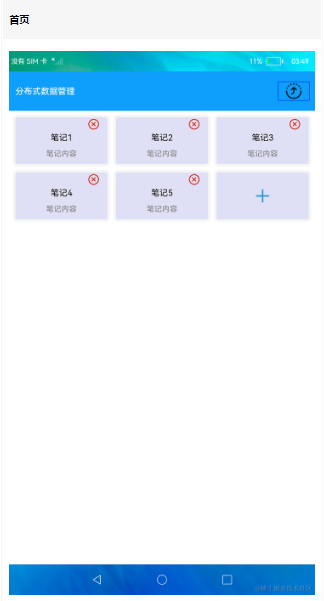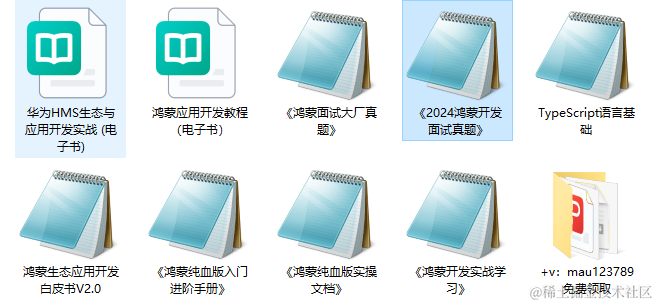

HarmonyOS开发实例:【分布式数据管理】
电子说
描述
介绍
本示例展示了在eTS中分布式数据管理的使用,包括KVManager对象实例的创建和KVStore数据流转的使用。
通过设备管理接口[@ohos.distributedDeviceManager],实现设备之间的kvStore对象的数据传输交互,该对象拥有以下能力 ;
1、注册和解除注册设备上下线变化监听
2、发现周边不可信设备
3、认证和取消认证设备
4、查询可信设备列表
5、查询本地设备信息,包括设备名称,设备类型和设备标识
6、发布设备发现
效果预览

使用说明 |
1.两台设备组网。
2.在一台界面中点击右上角的流转按钮,在弹窗中选择对端设备拉起对端设备上的应用。
3.拉起对端设备后,在界面中点击"+"按钮新增笔记卡片,点击每个卡片右上角的"X"按钮可以删除此卡片,可以看到对端设备和当前设备界面数据保持一致。
4.操作对端设备,当前设备界面也会保持和对端设备界面显示一致。

具体实现
管理kvStore
1、页面初始化时获取此应用所需能力:引入@ohos.data.distributedKVStore初始化kvstore数据库并对使用kvstore.on数据change进行监听,通过appstorge判断获取相应的key判断是否是分布式节点 。
源码:
/*
* Copyright (c) 2020-2023 Huawei Device Co., Ltd.
* Licensed under the Apache License, Version 2.0 (the "License");
* you may not use this file except in compliance with the License.
* You may obtain a copy of the License at
*
* http://www.apache.org/licenses/LICENSE-2.0
*
* Unless required by applicable law or agreed to in writing, software
* distributed under the License is distributed on an "AS IS" BASIS,
* WITHOUT WARRANTIES OR CONDITIONS OF ANY KIND, either express or implied.
* See the License for the specific language governing permissions and
* limitations under the License.
*/
import abilityAccessCtrl from '@ohos.abilityAccessCtrl'
import common from '@ohos.app.ability.common'
import { NoteModel } from '../model/NoteDataModel'
import { NoteListItem } from '../common/NoteItem'
import NoteDataSource from '../common/BasicDataSource'
import { TitleBar } from '../common/TitleBar'
import { KvStoreModel } from '../model/KvStoreModel'
import { RemoteDeviceModel } from '../model/RemoteDeviceModel'
import { transStrToNoteModel } from '../model/NoteDataModel'
import Logger from '../util/Logger'
import Want from '@ohos.app.ability.Want';
const NOTES_CHANGE = 'notesChange'
const EXIT = 'exit'
let kvStoreModel: KvStoreModel = new KvStoreModel()
let notesNum: number = 0
const TAG = 'KvstoreIndexPage'
@Entry
@Component
struct Index {
private noteDataSource: NoteDataSource = new NoteDataSource([new NoteModel('', '')]);
@State isDistributed: boolean = false
private remoteDeviceModel: RemoteDeviceModel = new RemoteDeviceModel()
aboutToAppear() {
let context = getContext(this) as common.UIAbilityContext
let atManager = abilityAccessCtrl.createAtManager()
try {
atManager.requestPermissionsFromUser(context,['ohos.permission.DISTRIBUTED_DATASYNC']).then((data) = > {
Logger.info(TAG, `data: ${JSON.stringify(data)}`)
}).catch((err: object) = > {
Logger.info(TAG, `err: ${JSON.stringify(err)}`)
})
} catch (err) {
Logger.info(TAG, `catch err- >${JSON.stringify(err)}`);
}
let want = JSON.parse(AppStorage.Get('wantMsg')) as Want;
Logger.info(TAG,`getWant =${JSON.stringify(want)}`);
if(want.parameters != undefined) {
if (want.parameters.isStage === 'Stage') {
this.isDistributed = true
}
}
kvStoreModel.setOnMessageReceivedListener(NOTES_CHANGE, (value) = > {
Logger.info(TAG,`NOTES_CHANGE${value}`)
if (this.isDistributed) {
if (value.search(EXIT) !== -1) {
Logger.info(TAG,`[json]EXIT${EXIT}`)
context.terminateSelf((error) = > {
Logger.info(TAG,`terminateSelf finished, error=${error}`)
})
} else {
let str: string = value.substring(0, value.lastIndexOf('}]') + 2);
this.noteDataSource.dataArray = transStrToNoteModel(str);
this.noteDataSource.notifyDataReload()
let strNum: string = value.substring(value.lastIndexOf('numBegin') + 'numBegin'.length, value.lastIndexOf('numEnd'));
notesNum = Number(strNum)
}
}
})
}
deleteNoteCallBack = (item: NoteModel) = > {
Logger.info(TAG, `deleteNote${JSON.stringify(item)}`);
let dataArray: NoteModel[] = this.noteDataSource.dataArray;
for (let i = 0; i < dataArray.length; i++) {
Logger.info(TAG, `i = ${i} and dataArray = ${JSON.stringify(dataArray[i])}`)
if (dataArray[i].title === item.title) {
Logger.info(TAG, `deleteNote index` + i);
this.noteDataSource.dataArray.splice(i, 1);
break
}
}
this.noteDataSource.notifyDataReload()
kvStoreModel.put(NOTES_CHANGE, JSON.stringify(this.noteDataSource.dataArray) + 'numBegin' + notesNum + 'numEnd');
}
startAbilityCallBack = (key: string) = > {
Logger.info(TAG,`startAbilityCallBack${key}`);
if (NOTES_CHANGE === key) {
kvStoreModel.put(NOTES_CHANGE, `${JSON.stringify(this.noteDataSource.dataArray)}numBegin${notesNum}numEnd`);
}
if (EXIT === key) {
kvStoreModel.put(NOTES_CHANGE, EXIT)
}
}
build() {
Column() {
TitleBar({
startAbilityCallBack: this.startAbilityCallBack,
remoteDeviceModel: this.remoteDeviceModel,
isDistributed: $isDistributed
})
Grid() {
LazyForEach(this.noteDataSource, (item: NoteModel, index) = > {
GridItem() {
NoteListItem({
note: item,
deleteNoteCallBack: this.deleteNoteCallBack,
noteID: index
})
}
.onClick(() = > {
Logger.info(TAG,`GridItem.click${item.title}`);
if (item.title === '' && item.content === '') {
notesNum += 1
this.noteDataSource.dataArray[this.noteDataSource.dataArray.length-1] = new NoteModel(`note ${notesNum}`, 'noteContent');
this.noteDataSource.dataArray.push(new NoteModel('', ''));
this.noteDataSource.notifyDataReload()
if (this.isDistributed) {
kvStoreModel.put(NOTES_CHANGE, `${JSON.stringify(this.noteDataSource.dataArray)}numBegin${notesNum}numEnd`);
}
}
})
}, (item: NoteModel) = > item.title)
}
.columnsTemplate('1fr 1fr 1fr')
.columnsGap(10)
.rowsGap(10)
.padding(10)
.margin({ bottom: 50 })
}
}
onDestroy() {
if (this.remoteDeviceModel !== null) {
this.remoteDeviceModel.unregisterDeviceListCallback()
}
if (this.isDistributed) {
this.isDistributed = false
}
}
}
2、如果是分布式节点,如果数据发生变化,处理数据并使用.noteDataSource()进行reload数据。
3、页面通过kvStore对象进行增删改查会触发其他已连接设备的kvStore.on监听。
管理分布式设备(节点)
1、创建设备管理对象,并指定参数kvstore应用包deviceManager.createDeviceManager("ohos.samples.kvstore", (error, value) => {})
2、获取可信设备列表,"this.deviceManager.getTrustedDeviceListSync())" 。
3、监听设备状态,"this.deviceManager.on('deviceStateChange', (data) => {})",从而对可信设备列表管理。
审核编辑 黄宇
- 相关推荐
- 热点推荐
- 数据管理
- 分布式
- HarmonyOS
- OpenHarmony
-
鸿蒙开发接口数据管理:【@ohos.data.distributedData (分布式数据管理)】2024-06-07 2171
-
HarmonyOS实战案例:【分布式账本】2024-04-12 2038
-
HarmonyOS数据管理与应用数据持久化(一)2023-11-01 347
-
#硬声创作季 #HarmonyOS HarmonyOS应用开发-06.1 分布式数据管理平台设计理念-2水管工 2022-11-16
-
【学习打卡】OpenHarmony的分布式数据管理介绍2022-07-15 1811
-
OpenHarmony标准设备应用开发(三)——分布式数据管理2022-04-07 6868
-
HarmonyOS分布式应用上架问题分析2021-12-24 2576
-
如何高效完成HarmonyOS分布式应用测试?2021-12-13 2369
-
HarmonyOS分布式应用框架深入解读2021-11-22 4776
-
如何通过基于云的数据管理技术实现分布式设备的态势感知?2021-05-25 1401
-
HarmonyOS分布式数据管理三大核心技术是什么?2021-03-14 5982
-
HarmonyOS分布式数据库,为啥这么牛?2020-11-19 2208
-
HarmonyOS应用开发-分布式设计2020-09-22 2592
-
HarmonyOS应用开发-分布式任务调度2020-09-18 2854
全部0条评论

快来发表一下你的评论吧 !

